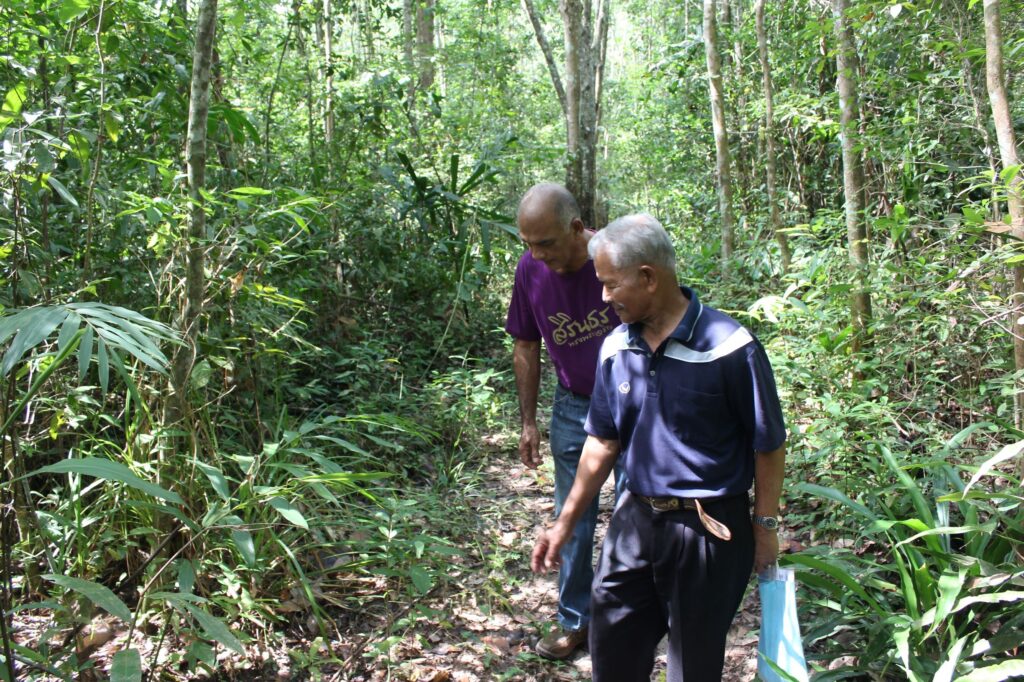
Phatthalung, Thailand
VF Corporation brands Timberland, Vans and The North Face have partnered with Terra Genesis and smallholder Wanakaset farmers in Thailand in order to develop the world’s first Regenerative Outcome Verified – ROV™ rubber supply system.
Improvement in rubber farmer and community well-being
Meet sourcing requirements for 500MT of rubber by 2023
Our approach to supply development began with a detailed study of the local landscape context of Phatthalung and the traditional land-management system of the local community, and the development of relationships with key leaders of the local rubber producer network. We were guided by the wealth of proven traditional knowledge, and experience from the local community, who have long recognized the importance of the regeneration of ecosystem health and the development of resilient local economies. The subsequent project design was structured to provide beneficial outcomes for the farmers, the community, the landscape, and our brand partners at VF.
The “Wanakaset” farming system (meaning: agroforestry and self-reliance in Thai) integrates rubber trees with a great variety of other beneficial species, including fruit trees, perennial vegetables, medicinal herbs, timber, and more. No two Wanakaset agroforestry farms are alike; they are each a reflection of the specific needs and creativity of the farmer who created and manages the system. These are extremely biodiverse systems, both in terms of agrobiodiversity (up to 100 crop varieties in some cases) as well as a great diversity of native plants, animals and fungi. Farmer application of ecological management practices has been a key driver of regeneration of the local landscape, reestablishing a thriving forest ecology analogous to the pre-existing forest of the Tenasserim rainforest.
Wanakset farmers have been practicing regenerative farming for decades because they know that this is the best way to ensure the wellbeing of their families, their community and landscapes, now and in the future. However, they have never been able to receive a premium for their product which has prevented the expansion and adoption of their methods by other farmers. By establishing a long-term mutually-beneficial partnership with VF, more farmers are now able to receive a premium for their differentiated product, as well as access to the capital, resources, information and institutional support needed to incentivize other farmers in their network to transition from conventional to regenerative forms of production. Rubber is now being sent to VF’s manufacturer in China. In order to meet their supply requirements we will be integrating thousands of new farmers in Phatthalung and neighboring provinces, into the regenerative rubber group over the next few years.
In order to define and contextualize what regeneration means in this landscape context we have worked with the farmers to co-develop an ROV™ system for the project which enables us to track the regenerative impact of the project in real time. We use a combination of on-the-ground data collection and remote sensing that is provided by the farmers themselves, local researchers, and Terra Genesis. We can now verify the social and ecological outcomes being achieved and provide farmers with concrete data that reveal how regeneration is taking place. This supports the further evolution of regenerative approaches to production. The ROV™ provides a sound foundation of geographically-specific data to be considered alongside regional environmental laws and regulations, which is crucial for client partners who are looking to substantiate environmental claims being made about their products. This approach enables VF to substantiate claims regarding products manufactured with rubber from this origin, and for their customers to choose a product that is aligned with their environmental and social values.
